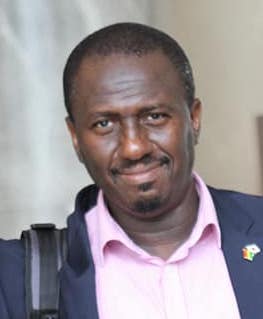 Michael A.K. Senayah
Michael A.K. Senayah
Minister Counsellor (Trade & Investment)
Ghana Embassy in Tokyo
International Development Studies Program (’08)
Please tell us about your career path so far. What is your area of specialization and how did you come to work in this area?
I entered the University of Ghana in 1990 and read biochemistry & food science for my first degree, and after I undertook my national service, where I served in a high school as a biology and chemistry teacher (1993-1994).
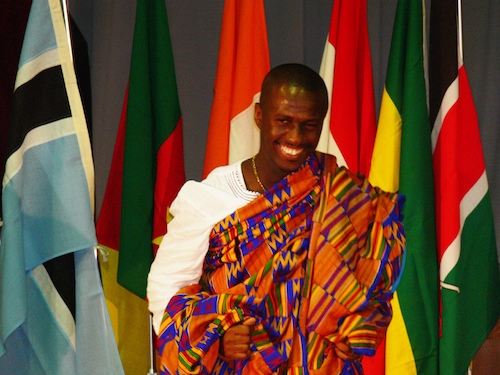
Showcasing Ghanaian culture at JICA TIC-African Week during Michael’s GRIPS days.
I really enjoyed parting knowledge to these young men so much that, coming to think of it, I should have continued teaching in that particular high school (St. Peter Secondary School) but then my dream was to work in the food industry and Nestle Ghana Limited was my target.
Still back at the high school, the students liked the way I applied my background in biochemistry and food science to demystify both biology and chemistry, so much so that, when they realised I was leaving after serving my national service, they requested me to develop a pamphlet for them to cover the rest of the syllabus; especially the controversial topics, which I did and labelled it “Zano Series”. The principal of the high school also took fond of me and tried convincing me to stay since they lacked a biology teacher but my dream and passion to work in Nestle did not avail me the opportunity to accept the principal’s invitation so finally, I left to seek for my own dream in the food industry.
For 4 years (1994-1998), I did my best but could not get myself employed in my dream company; Nestle Ghana nor any other food industry. So in 1998, to overcome my frustrations, I applied for the Master Of Philosophy Degree in Food Science at the same University of Ghana hoping that during either my course work or research work, I might get in contact with a food industry willing to take me on, if even for internship, but this never happened till I completed my programme in 2002.
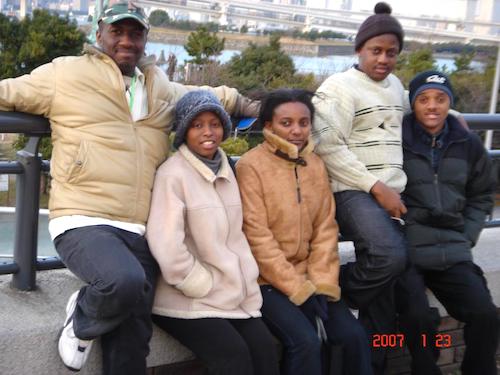
Enjoying free time with some African course mates in Odaiba
I had to stay unemployed again for another 2 years, just assisting some SMEs in sales/marketing till 2004 when I got the information that the Ministry of Trade and Industry was recruiting officers. (Bear in mind, even during my first degree programme, I had vowed never to work as a civil servant due to the perception going round that nothing ever gets done there etc.). But then after hearing of the pending recruitment, I visited the Ministry’s library to read about their activities and mandates and even had a brief chat with some of the officers there. I got really impressed and hopeful once again because I realised that even though I could not get to work in a food industry, at the Ministry, I could be still supporting the food industries by assisting to develop policies that will help the food industry and any other industries to thrive in Ghana.
So God being on my side, I got employed at the Ministry of Trade and Industry on the 9th August, 2004 as an Assistant Industrial Promotion Officer, 2 days after my 37th birthday.
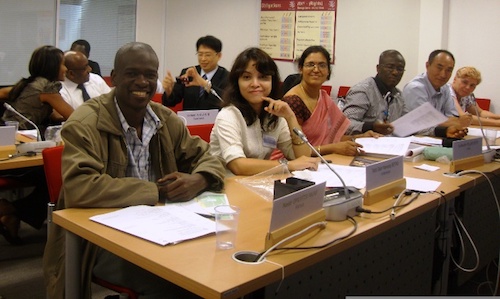
Michel as a participant in the Advanced WTO Sanitary and Phyto-Sanitary (SPS) course in Geneva, Switzerland
After working for the Ministry for 2 years, an opportunity came up and I was nominated to apply for the JICA Scholarship for the International Development Studies Program at GRIPS (This opportunity of mine was connected to my marriage, of which I will make reference later.) In actual fact I was surprised to have been selected by GRIPS because I had then lost my dad (may his soul rest in perfect peace) and was not really in the right frame of mind during the oral interview and therefore did not perform well as against two other contestants from other institutions – it was really obvious, I knew it myself, saw it in the eyes of the interviewers etc.
So it really came as a surprise, when I got an email from an office colleague, while in India on a training course, asking me to urgently get in touch with the JICA office in Accra. When I did, I was informed that I had been accepted by GRIPS as a result of my “Motivational Statement Paper”. So to cut the story short, I was enrolled in GRIPS somewhere in August 2006 and completed the program in March, 2008.
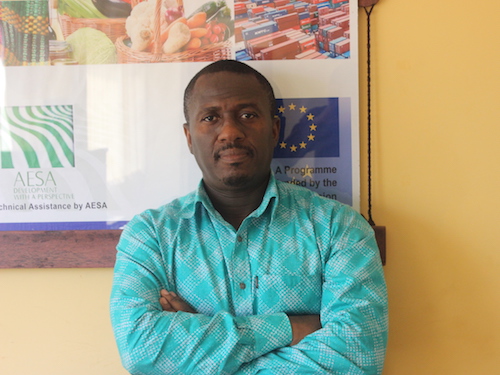
As an Imprest Administrator & Programme Director for the TRAQUE Programme, an EU-funded project (2014-’17)
For my research paper (ADR), I looked at the “Economic Impact of the Introduction of the WTO-SPS Agreement on the Non-Traditional Exports of Ghana”, which concerns the application of food safety and animal and plant health regulations.
After completing GRIPS, when I got back home to my work and department (Standards), I continued focusing on issues of Quality, WTO- SPS & TBT (Technical Barriers to Trade) and carved a niche for myself to the extent that the WTO SPS Secretariat advertised one of their newly created training programmes (Advanced Course in SPS), and for one to qualify, one needed to undertake a country survey on SPS activities and identify the gaps in the system. This I did and was therefore invited by the WTO-SPS Secretariat to undertake the Advanced Course in SPS Agreement; the first Ghanaian to be invited for that course, complete his assignment and after excelling to be invited again to be a mentor for participants from Liberia and Sierra Leone.
Just after that, while still being attached to the Standards Division at the Ministry of Trade and Industry, I was appointed as the “Programme Director and Imprest Administrator for an EU funded programme with a budget of 15 million Euros referred to as Trade Related Assistance and Quality Enabling Programme (TRAQUE) (www.traqueghana.org) from 2014-2017. The programme was to transform the National Quality Infrastructure in Ghana in preparation of the implementation of the Economic Partnership Agreement (EPA). During the period when I was in charge of this programme, it looks like I made my mark and as a result, was noticed by a whole lot of institutions like the West Africa Quality System Programme under ECOWAS, the African Accreditation Cooperation (AFRAC) etc. to the extent that I was invited to Kenya in 2016 to share my experiences with regards to the TRAQUE Programme as an Imprest Administrator, because by the time I took over, the Programme was hovering around 30% in terms of budget utilisation and activity delivery but by the time the programme came to an end, it was hovering around 90%.
You are currently serving as Minister-Counsellor (Commercial) at the Embassy of Ghana in Tokyo; what are your main responsibilities and duties.
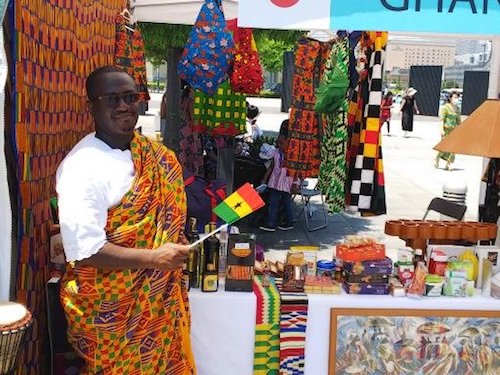
Michael as Minister-Counsellor at an African Expo & Fair in Yokohama, May 2019
As a Minister Counsellor (Commercial), my main assignment is to promote trade between Ghana and Japan (positive balance of payment) and also attract more Japanese investors into Ghana. To achieve this challenging fit, my responsibilities and duties require me to attend a lot of fairs and expos to identify potential companies with respect to our priority areas. I am also expected to undertake various fairs to promote made-in-Ghana products and services to the Japanese consumers and also undertake various investment pitches to the Japanese private sector to present all the opportunities available in Ghana, which is strategically positioned in the ECOWAS region (market access to over 350 million people) as well as being the secretariat of the African Continental Free Trade Area (AfCFTA) -market access to over 1.2 billion people.
Other expectations are for me to follow-up with Toyota Tsusho and Nissan, who are planning to establish assembling plants for Toyota, Suzuki and Nissan vehicles respectively in Ghana. It is my responsibility to make sure that the necessary expected activities are rolled out. I am also to find export markets within Japan for our made-in Ghana products etc.
In your current capacity, what do you see as the main opportunities and challenges for the Ghana – Japan relationship over the course of the next five to ten years?
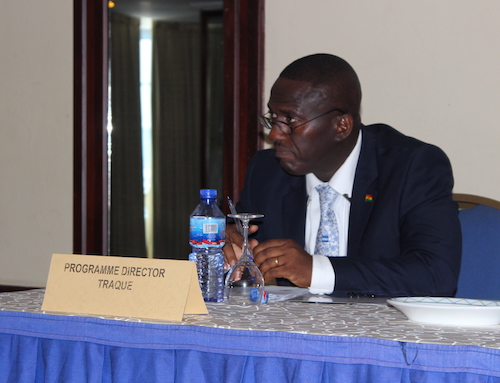
In his role as Programme Director of TRAQUE
For opportunities, I would say Ghana being the gateway to the ECOWAS market as well as the Continental Free Trade Area with a total consumer population of 1.2 billion. Secondly, with our current industrialisation drive, where a lot of incentives have been made available to any Japanese strategic investor, I believe it is my responsibility to lay emphasis on these opportunities for the Japanese private sector to think of moving to Africa and for that matter Ghana, to invest since it is lucrative.
For challenges, Ghana is currently looking for more trade and attracting more investments into its economy instead of the usual aid programmes. In Japan, however, I still see developing partners showing the same old videos of the negative aspects of Africa to Japanese investors and to me this will be a challenge to overcome. A case in point is a video that is trending, which is supposed to promote the activities of a Japanese lady artist, who is supposed to be the Ambassador of this year’s Tokyo International Conference on African Development (TICAD 7). The video is only showing the very poor parts of an African country and this will only attract NGOs who will be only thinking of sending aid to that remote country in Africa, instead of more trade and investment (Ghana Beyond Aid).
The other challenge is the Japanese investor thinking that Africa is too far for them to venture and the risk-averse nature of the Japanese private sector, their mind-set and their perception of Africa. This will be a herculean task for me to unravel. Other challenges are the volume of work and the lack of the Japanese language.
What are some of the biggest challenges you face in your work? And what have been the most interesting or rewarding aspects of your career thus far?
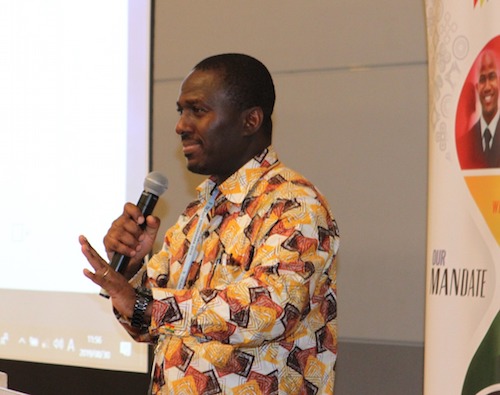
Michael giving closing remarks at Ghana Investment Promotion Seminar during TICAD 7 on 30th August, 2019
With regard to challenges I have faced in my career, then we can make mention of issues of export rejects that my country has faced with regard to our agro-based products not meeting the necessary quality and technical requirements. Also, not enough capacity-building programmes in my field as well as most politicians having little knowledge in the same field hence not appreciating the needed support required till a grave problem arises, the so-called fire-service approach in solving issues. Another challenge is not having the right officers with the required background to support at the Ministry.
The most interesting and rewarding aspects of my career can be linked to the earlier reference made with regard to getting invited by the WTO- SPS Secretariat for the Advanced course in SPS as well as manning the EU funded project (TRAQUE) as earlier indicated. As a result of my background and expertise, I have travelled to 23 countries, 12 in Africa, 4 in Asia, 3 in Europe, 2 in the Americas, 1 in Middle East and then Australia, and all related to a conference or training programme in my field/career.
What led you to GRIPS? What was the most important thing you learned while here and how has your experience at GRIPS prepared you for future endeavours?
In actual fact, what really brought me to Japan and GRIPS in 2006 was my marriage. I got married in 2005 to my wife who was also working at the Ministry of Trade and Industry. And just after our marriage, she obtained a JICA scholarship to undertake a masters programme in IUJ in Niigata. So when a similar programme came to the Ministry-JDS programme also by JICA, the then Chief Director could not look on with us separated just a month after we got married, so he nominated me to compete with others from other institutions and God being on my side, I got invited to GRIPS for the IDS Program.
Frankly speaking, it was at GRIPS that l read my first economics textbook and to sit in an economics class. So though I was thrilled by the course, it called for a lot of reading to understand the concepts since economics was full of assumptions. At GRIPS, studying with colleagues from other parts of the world, first and foremost, improved my networking, introduced me to diverse cultures and in that, I took up most of the positive aspects. The networking also assisted my career since, most of us were in touch and assisted each other when the occasion presented itself.
What are some of your fondest memories of your time spent at GRIPS?
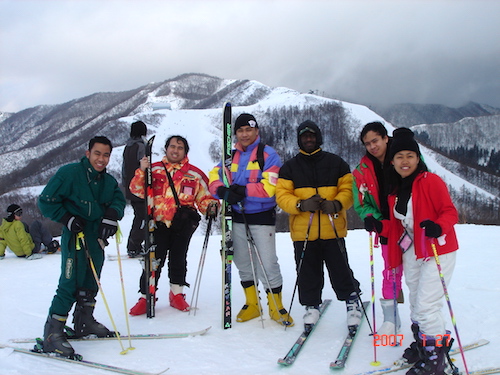
Learning how to ski was one of Michael’s most memorable moments of his time at GRIPS.
The friendship, collaboration between lectures and students, the discipline acquired and being lectured by great professors like the late Hayami-Sensei of blessed memory. Also, living in Odaiba and learning to ski for the first time are among my fondest memories of GRIPS. And finally not the least, my first-born being born in Japan while I was at GRIPS!
What do you miss about Ghana and what do you do like most about living in Tokyo? How has Tokyo changed since you completed the IDS Programme at GRIPS in 2008?
With regard to Ghana, what I really miss is the friendliness of my fellow Ghanaians and some of our local dishes. What I like most about living in Tokyo is the cleanliness of the atmosphere, the consciousness of the Japanese people to the environment, the efficient transport system and the constant power supply.
Ever since I completed the IDS Program, the difference that I observe currently after 11 years about Tokyo is that Japanese people have become a bit more accommodating and a little bit more open. Also, many more speak English these days, even if just a little.
How do you maintain a balance between your work and the rest of your life? And what is your favourite thing to do when you are not working?
I try as much as possible to separate my work from my social & family life, such that, when l am at work, it is all about work and I give out all 100% and when I close at work and come home, it is also all about my family and social life. It is only emergency assignments that I send home and even then only at weekends.
When not working, the favourite thing I indulge in is having quality time with my family. I have two boys, and if I am not helping them with homework etc. we engage in all manner of activities including playing computer games, especially FIFA games on XBOX, of which I have become a bit addicted. Apart from that, I like gardening, walking my dog, going to the beach with the family as well as sight-seeing.
If you could give one piece of advice to anyone considering studying at GRIPS what would it be?
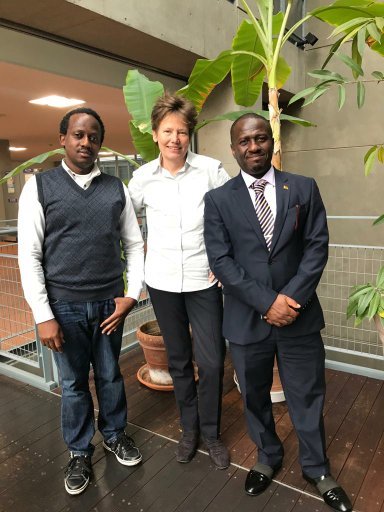
Back on Campus and meeting with former classmates and staff, April 2019
The person should be really focused on his/her programme, undertake a research area which is in-line with his career path and should always maintain the network of friends even as you keep each other updated. This is really beneficial for your career development and advancement.
How would you like to maintain involved with the School? What do you expect from GRIPS as an alumnus and do you have any suggestions on how to further utilize the GRIPS alumni network?
I would like to be always updated on activities involving GRIPS and if possible linked to research findings, which could be implemented in developing countries. Just thinking if it is possible to get alumni in various countries to come together i.e. within each country, all alumni should be linked together (contact details), where they can then appoint a leader who then gets linked to other leaders in a region etc. and form a kind of WhatsApp platform, and this will help us to get to know what is happening within the network. Various groupings can undertake various projects with their country, region in the name of GRIPS and report to the school etc. and this can be moved further to a higher level.
Well, I do not believe in luck or that things just happen. With me, this experience had a hand controlling it, which is the Grace of God was at work in my life. And for that matter, I will categorically state that “Behind every successful man, is his Maker, family and friends” (bad or good).
Thank you!




